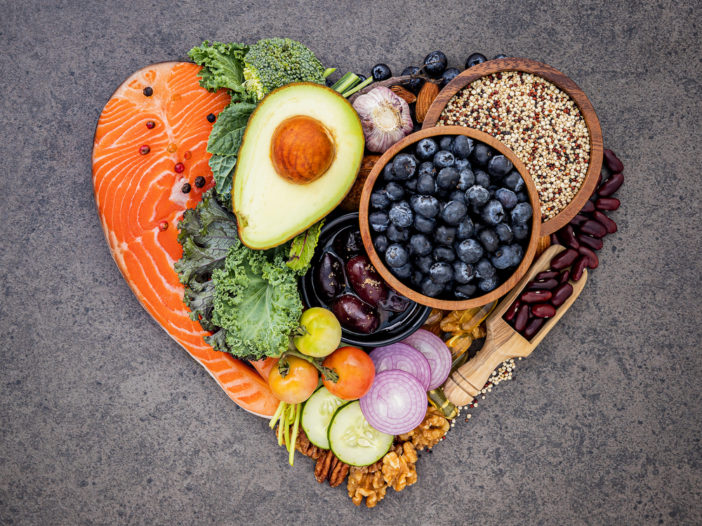
Some women who have had so called “normal” cholesterol readings all their lives, often see a marked change at the time of their menopause.
Levels of cholesterol can increase during or after the menopause, due to a reduction in the body’s levels of oestrogen. And that’s because this hormone helps the liver to regulate cholesterol levels.
And many women panic when they hear the word high cholesterol, but should they?
Cholesterol is often considered to signify bad news, and yet it is so important for our overall health. It is not always the enemy we are often led to believe it is.
In fact, it is actually sugar which is the biggest risk to heart health (but more on that another time).
So, what is cholesterol and why do we need it?
Cholesterol is a fatty substance found in every cell in the body and is produced naturally by the liver. And it has a role in thousands of functions in the body.
Here are a few.
It is essential for:
Production of hormones (e.g., oestrogen, thyroid, testosterone etc)
Production of vitamin D and bile salts required for digestion
Maintenance of cell membranes which cover our nerves and brain
And so, without cholesterol, we would end up in a pretty unhealthy condition. For menopausal women, hormone levels, vitamin D status and brain function are of course super important. And so, maintaining the right levels of cholesterol in our bodies during this time is critical.
And the reality is this: We should not be looking at lowering our cholesterol at all costs. But we should be focusing on optimising the right sort of cholesterol in our bodies.
There are several types of cholesterol:
High- density lipoproteins – HDL (often referred to as good cholesterol). These remove cholesterol from our tissues and take it back to the liver so that it can be recycled and excreted
Low -density lipoproteins – LDL (commonly known as “bad” cholesterol) carry cholesterol from the liver to our tissues and may deposit it in our artery walls.
Triglycerides – these are another type of fat which is different from cholesterol, but an important marker to monitor. And that’s because high triglycerides can put you at a greater risk of heart disease, liver disease and diabetes.
So, what should our goal be when it comes to managing cholesterol?
Knowing the kind of cholesterol, you have in your body is key to promoting good health.
Rather than focusing on your overall cholesterol level, it is far better to look at the following:
Levels of HDL (good) cholesterol versus LDL (bad) cholesterol
Triglyceride levels
Ratio of triglycerides to HDL
Ratio of total cholesterol to HDL
And looking at your results in this way, will give you a good indication of where (if at all), you need to improve your cholesterol profile.
And ultimately it is all about lowering triglycerides and raising the levels of necessary (and essential) good cholesterol in your body.
How do you optimise your cholesterol profile?
- Don’t follow a low- fat diet! Most low-fat foods are full of sugar. And sugar and refined carbs are converted into abnormal blood cholesterol. When you eat sugar, your liver produces the bad sort of cholesterol and increases triglycerides. It also lowers the good cholesterol.
- Fill your diet with healthy fats such as avocadoes, nuts, seeds, olive oil, coconut oil and oily fish. These all help to improve the type of cholesterol in your body.
- Remember that the only really bad fat is trans-fat. This is the type of fat found in margarine, processed oils (soy, sunflower, canola, corn, grapeseed) as well as many baked goods and processed foods, such as crisps, chips, cakes, and biscuits. This is the type of fat to eliminate completely from your diet.
- Keep alcohol to a minimum as this can lead to increased triglycerides and fat in the liver.
- Increase fibre in the diet. Fibre binds cholesterol and fats and lessens their absorption which decreases blood cholesterol and LDL and increases HDL. Good sources include whole grains, fruits and veg, nuts and seeds and beans and pulses.
- Exercise regularly. Walking, weight training and HIIT are all good options to optimise cholesterol levels.
Think about supplements to improve cholesterol profile
You may also want to look at supplements which can help to improve cholesterol profile.
My favourites include a good quality fish oil which will benefit those with low HDL and high triglycerides as well as red rice yeast which is a powerful cholesterol lowering herbal formula.
Of course, supplements should be considered under the guidance of a nutritionist.
If you are keen to understand your cholesterol profile in a bit more detail, why not book a call to find out how I may be able to help you optimise your health in your peri and menopause years?
And get started today by downloading my ultimate guide for a symptom free menopause

